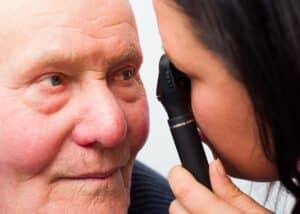
Older adults are susceptible to many eye conditions that can lead to vision loss. One of those conditions is glaucoma. According to the Glaucoma Research Foundation, approximately 3 million people in the United States have glaucoma, but only half of them have been diagnosed. Glaucoma is responsible for between 9 and 12 percent of cases of blindness and is the second leading cause of blindness worldwide. Knowing more about glaucoma can help to prevent it.
Glaucoma Basics
Glaucoma isn’t really a single condition. It is a group of conditions, all of which harm the optic nerve. The damage to the nerve happens because the pressure inside the eye is too high. Although glaucoma can happen at any age, it most often happens after the age of 60.
There is no cure for glaucoma. When vision is lost because of the disease, it cannot be recovered. However, when it is diagnosed early, the progression of the disease can be slowed and may even be prevented. To catch glaucoma early, the American Academy of Ophthalmology recommends that people over the age of 65 have a comprehensive eye exam, including dilation, every one to two years.
Symptoms of Glaucoma
Often glaucoma has no noticeable symptoms. If symptoms are present, they depend on the kind of glaucoma and the severity of the disease. Some of the symptoms are:
Open Angle Glaucoma
- Loss of vision in patches to either central vision or peripheral (side) vision. This usually happens in both eyes.
- Tunnel vision when the disease reaches advanced stages.
Acute Angle-Closure Glaucoma
- Pain in the eyes, sometimes severe.
- Terrible headaches.
- Blurry vision.
- Nausea and vomiting.
- Red eyes.
- Seeing halos around light sources.
If your aging relative complains of severe headaches, pain in their eyes, or blurred vision, they should receive emergency medical treatment.
Glaucoma Risk Factors
Some people are at a higher risk for developing glaucoma. Some of the risk factors for glaucoma are:
- Being above the age of 60.
- Having high intraocular pressure.
- Family history of the disease.
- Being of African-American, Asian, or Hispanic descent.
- Having conditions like diabetes, heart disease, sickle cell anemia, or high blood pressure.
- Being very near or farsighted.
- Eye injuries or some kinds of eye surgery.
If your aging relative has glaucoma, home care can help them to manage the disease and deal with vision loss. Home care can remind the senior to use medications prescribed by the doctor to prevent the disease from getting worse. A home care provider can help with vision loss by reading instructions, mail, and even books to the older adult. Home care can also assist the senior to avoid objects and uneven surfaces that they cannot see, but that could cause them to trip and fall.
Sources
https://www.mayoclinic.org/diseases-conditions/glaucoma/symptoms-causes/syc-20372839
https://www.webmd.com/eye-health/glaucoma-eyes
https://www.medicalnewstoday.com/articles/9710.php
https://www.glaucoma.org/glaucoma/glaucoma-facts-and-stats.php
If you or an aging loved one are considering home health care in River Oaks, TX, please call the caring staff at At Your Side Home Care. We will answer all of your senior care questions. Call today: (832) 271-1600.
Our Certified Nurse Aides, 24-Hour Live-in Assistants and Home Health Aides are available 24 hours a day, 365 days a year. We also provide the security and confidence of 24-hour Telephone Assistance, so fast, reliable help is always available when it's needed. To learn more about our homecare services see our homecare services page.
Different people need different levels of homecare. To meet the requirements of our clients, At Your Side Homecare maintains consistent staffing levels of caring professionals. Homecare service is available for as little as a few hours a week, or as many as 24 hours a day, seven days a week
- 5 Signs a Senior Might Be in the Beginning Stages of Dementia - April 25, 2025
- What Solutions Can Help Seniors with Mental Health Challenges? - April 18, 2025
- How Does Senior Home Care Help Make Aging in Place Possible? - April 11, 2025



